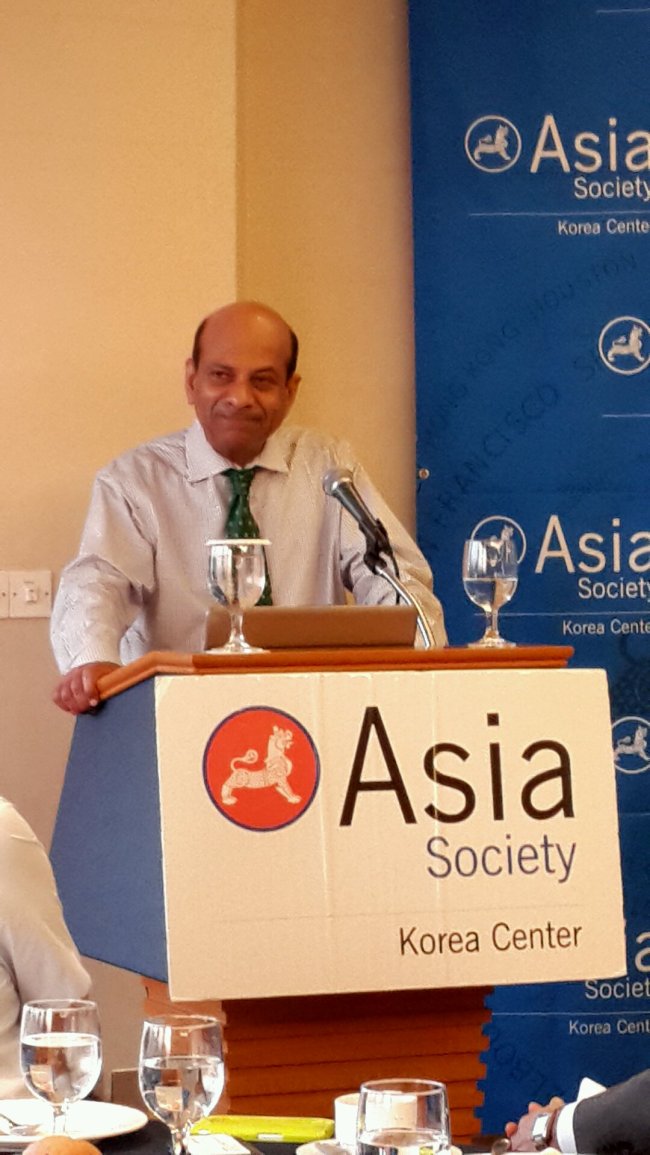In a world which has long been caught in slow growth, one should turn the conventional business conceptions upside down in order to seek new growth opportunities, according to one of the world’s top innovation gurus.
“When the economy is sluggish, companies fear changes and risks, but it is ironically in such times that they must invest in innovation,” Vijay Govindarajan, professor at the Tuck School of Business at Dartmouth College, told The Korea Herald in an interview.
The Indian professor, who also authored the bestseller “Reverse Innovation,” is widely recognized as one of the most influential business thinkers in the world.
His idea of reverse innovation is about designing cost-effective products based on the consumer needs of developing countries and then selling them to advanced countries.
For instance, General Electric created an ultralow-cost electrocardiogram for the rural Indian market, which was later exported to the United States and other Western countries.
“In developed countries, ECGs were not only extremely expensive but bulky and weighty, as well as dependent on power supply,” the Indian professor said.
“In order to meet the medical demands of the rural Indian regions, however, we had to turn our thoughts upside down and come up with a completely different product.”
This is why GE developed a light, portable battery-operated ECG, which could be carried around easily during doctors’ house calls.
This, however, was not the end of the story, the professor added.
“Following the success in India, the U.S. market also came to take interest in the compact ECG, to be installed in ambulances and in households for emergency uses,” he said.
“The innovation in the developing country acted as a trigger to create a new market in the developed country.”
As a result, the machine is currently sold in some 90 countries in the world, at a lower price than the conventional full-size ECG.
“We have long been accustomed to the idea that innovation is a costly change which starts in developed countries and then trickles down to the rest of the world,” the business guru said.
 |
Professor Vijay Govindarajan speaks at the August session of Asia Society’s Big Thinkers at Lotte Hotel in central Seoul on Monday evening. (Asia Society) |
“Companies competed for innovation because customers could pay for the resulting products and services.”
But the world has come to face limits under those conventional frames and may not move onto the next stage unless it turns its focus to the neglected bracket, he said.
“The key to breakthrough, as well as the challenge to it, lies at the bottom of the economic pyramid, the so-called non-consumers,” the professor said.
By facing the needs of these non-consumers, companies may break free from their existing way of thinking and step onto a new plane of business, he explained.
“Companies, of course, may hesitate to fully embrace the idea of starting in developing countries, where they see fewer opportunities of growth and expansion,” he said.
“But the money is there to be made, as the market is yet underdeveloped and potentially offers a huge transaction volume.”
The important point of reverse innovation, the professor stressed, is not about offering goods and services to developing countries out of charity.
“I do not believe in charity as there is not enough money in this world to be given away for free,” he said.
The reasonable approach to crucial issues such as water, housing, electricity and education is not through charity but through sustainable business, according to the professor.
“The key remaining task is how to prevent companies from obsessing on monetary profits and becoming greedy,” he said.
“But companies should now realize that our world has reached a boiling point, where resources are limited and taking away the profits of others will no longer be tolerated.”
This is why, he says, they must turn to opening a new market and creating an entirely new growth opportunity.
“Innovation is about tomorrow, something which has not yet come, something we cannot yet see,” Govindarajan said.
“But human nature tends to focus on the present, which is visible and tangible, and thus feels more secure.”
The cost of inaction, however, is greater than the cost of risk, the professor claimed.
“It may feel safe to remain within the conventional boundaries, but companies should realize that if they do not step out and innovate, somebody else will do it instead,” he said.
By Bae Hyun-jung (
tellme@heraldcorp.com)








